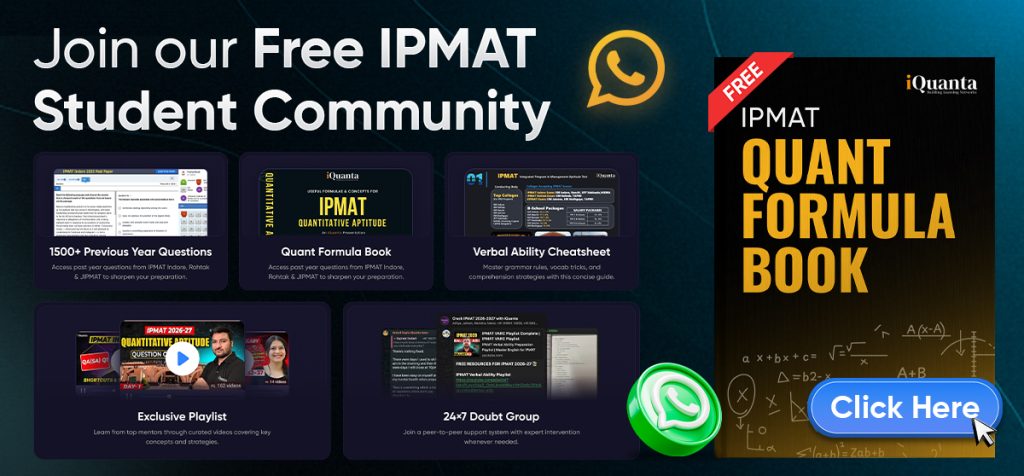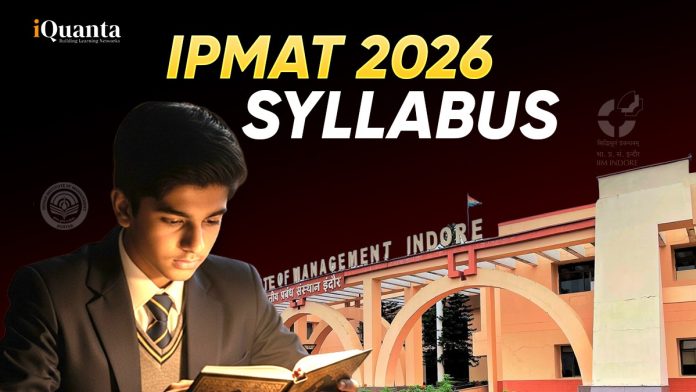IPMAT Syllabus 2026 for IIM Indore and IIM Rohtak: The Integrated Program in Management Aptitude Test (IPMAT) is a gateway for admission into the prestigious 5-year Integrated Program in Management (IPM) offered by top IIMs. There are three different IPMAT exams: IPMAT Indore, IP MAT Rohtak, and JIPMAT. This program includes Bachelor’s and Master’s degree in management, designed for students right after class 12.
IPMAT syllabus 2026 for IIM Indore and Rohtak is a crucial component of exam preparation. It typically includes Quantitative Ability, Verbal Ability, and Logical Reasoning. Understanding the IPMAT 2026 syllabus helps candidates plan strategically and focus on high-weightage areas. Candidates can check complete details about IPMAT syllabus, subject-wise topics, preparation tips, exam pattern and more below.
Understanding the IPMAT 2026 syllabus in depth is the first step towards your preparation. The IPMAT syllabus 2026 for IIM Indore and IIM Rohtak covers the key topics and subject areas that students need to master to succeed in the exam. By covering previous year trends and syllabus update, candidates can prioritize sections and cover their entire study plan.
Be part of the iQuanta’s growing exclusive IPMAT student community with 4000+ members. Get access to free IPMAT preparation resources, continuous guidance, 24*7 instant doubt resolution and a lot more.

What is IPMAT?
IPMAT is an entrance exam for admission to the Integrated Programme in Management (IPM), a five-year course that combines a Bachelor’s degree with an MBA. It is designed for students who have completed Class XII and aspire to build a career in business management.
There are three types of IPMAT exams:
- IPMAT Indore is accepted by IIM Indore, IIM Ranchi, IIFT Kakinada, IIM Amritsar, IIM Sirmaur (BMS), NIRMA, NALSAR, and TAPMI
- IPMAT Rohtak is accepted by IIM Rohtak and TAPMI
- JIPMAT is accepted by IIM Jammu, IIM Bodh Gaya, and TAPMI
The IPM program offers a continuous academic journey over five years, ending with an MBA degree awarded by the respective IIMs. It aims to develop well-rounded management professionals and offers an early entry into the corporate world.
| Features | IPMAT Indore | IPMAT Rohtak |
| Exam Name | Integrated Program in Management Aptitude Test | Integrated Program in Management Aptitude Test |
| Organized By | IIM Indore | IIM Rohtak |
| Program | IPM (5-Year Integrated Program in Management) | IPM (5-Year Integrated Program in Management) |
| Mode & Frequency | Online, once every year | Online, once every year |
| Exam Duration | 120 minutes | 120 minutes |
| Key Sections | Quantitative Ability (SA & MCQs), Verbal Ability | Quantitative Ability, Verbal Ability, Logical Reasoning |
| Accepted In | IIM Indore, IIM Ranchi, IIFT, DoMS NALSAR etc. | IIM Rohtak only |
What is the IPMAT Syllabus?
The IPMAT syllabus serves as a complete roadmap for aspirants for the IPMAT exam. It covers the key subject areas and types of questions candidates will face. Understanding the IPMAT syllabus early on helps in creating a focused and effective preparation plan for study.
With the IPMAT syllabus 2026, students can set up their study plans or schedules to focus on height-weighted sections such as Quantitative Ability, Verbal Ability, and Logical Reasoning (for IIM Rohtak). It also helps to identify key areas that require daily practice and conceptual clarity. Familiarity with the IPMAT syllabus 2026 ensures that aspirants are not caught off guard on exam day and enables them to utilize mock tests and study material.
IPMAT Syllabus 2026 PDF
Candidates must understand the IPMAT syllabus 2026 before starting their preparation for the IPMAT 2026 exam. The IPMAT syllabus outlines all the important topics that students must focus on, including Math, English, and Reasoning. Since the pattern is slightly different for IIM Indore and IIM Rohtak, clarifying everything in one place can make a difference.
The updated IPMAT syllabus 2026 PDF is designed to help candidates prepare with clarity. It includes all subject-wise topics and gives a better idea of what to expect in the exam. Whether students are just starting or reviewing their study plan, this PDF can be a go-to guide throughout their preparation journey.
It’s always easier to stay consistent when the right resources are available. With the syllabus PDF, aspirants don’t have time for irrelevant chapters and can build a smart, focused preparation strategy.
Subject-wise Breakdown of IPMAT Syllabus 2026 for IIM Indore
The IPMAT Indore exam checks how well students think, solve problems and understand English. It asks questions from school-level math (mostly from Classes 6 to 10) and advanced topics from Classes 11 and 12. English questions are based on grammar, vocabulary, and reading comprehension. Logical puzzles and data interpretation are also part of the test. The exam consists of three sections, each with a specific time limit and marking scheme:
| IPMAT Indore Exam Pattern 2026 | |||
| Section | Number of Questions | Time Limit | Marking Scheme |
| Quantitative Aptitude (Short Answer – SA) | 15 | 40 minutes | +4 for correct, no negative marking |
| Quantitative Aptitude (MCQ) | 30 | 40 minutes | +4 for correct, -1 for incorrect |
| Verbal Ability | 45 | 40 minutes | +4 for correct, -1 for incorrect |
| Total | 90 questions | 120 minutes | Total Marks: 360 |
Below is a subject-wise list of all the topics students should prepare for the IPMAT 2026 examination.
IPMAT Indore Quantitative Aptitude Syllabus
The Quantitative Aptitude section in IPMAT Indore tests a student’s numerical ability, logical thinking, and problem-solving skills. It is divided into two parts: Short Answer (SA) and Multiple Choice Questions (MCQs).
This section includes questions ranging from basic arithmetic to higher-level mathematics. Students are expected to have a clear understanding of core math concepts and the ability to apply them under time pressure. Regular practice and strong fundamentals are key to performing well in this section. The table mentioned below covers the IPMAT Indore Quantitative Aptitude Syllabus which is categorized as Number System, Arithmetic, Algebra, Geometry & Mensuration and Higher Mathematics.
| IPMAT Indore Quantitative Aptitude Syllabus | |
| Category | Topics |
| Number System | Finding Unit Digit, Cyclicity |
| Simplification, BODMAS | |
| Remainder Theorems | |
| HCF & LCM, HCF LCM of fractions | |
| Surds & Indices | |
| Concept of Factors | |
| Divisibility Rules in detail | |
| Factorials | |
| Mixed Questions with other topics | |
| Arithmetic | Percentages |
| Profit Loss & Discount | |
| Ratio & Proportion | |
| Partnerships | |
| Average | |
| Mixture & Alligation | |
| Simple & Compound Interest | |
| Time & Work | |
| Pipes & Cisterns | |
| Time, Speed & Distance | |
| Boats & Streams | |
| Relative Speed, Linear Races | |
| Trains | |
| Circular Tracks TSD | |
| Mixed Questions with other topics | |
| Algebra | Algebraic Identities |
| Linear Equations | |
| Quadratic, Cubic Equations | |
| Nature of Roots, Discriminant | |
| Inequalities | |
| Logarithms | |
| Functions | |
| Modulus Functions | |
| Arithmetic Progressions | |
| Geometric Progressions | |
| Maximum/Minimum Values of Functions | |
| Range & Domain of Functions | |
| Binomial Theorem | |
| Geometry & Mensuration | Lines & Angles |
| Triangles & Circles, Theorems | |
| Quadrilaterals & Areas | |
| Polygons and Internal, External Angles, | |
| Regular Polygons | |
| Coordinate Geometry | |
| Mensuration (Surface Area and Volumes of 3D Figures) | |
| Higher Mathematics | Matrices & Determinants |
| Set theory & Venn Diagrams (3 set) | |
| Relations & Functions | |
| Sequence & Series (Arithmetic & Geometric Progressions) | |
| Permutation & Combination | |
| Inequalities, Domain & Range | |
| Probability | |
| Modulus Functions | |
| Binomial Theorem | |
| Equations of Lines & Circles | |
| Trigonometry, Height & Distance based questions | |
| Mean, Median & Mode | |
IPMAT Indore Logical Reasoning & Data Interpretation Syllabus
Students are given puzzles, graphs, and logical situations to solve here. It checks how well a student can understand and quickly understand information. In this part, candidates should practice case-based questions, bar graphs, pie charts, and number Punto sales boost scores. In IPMAT Indore 2025, logical reasoning and data interpretation questions played a significant role based on previous year exam analysis.
- 3 questions from logical puzzles appeared in the Quantitative Aptitude Short Answer (SA) section.
- 5 questions based on calculation-heavy data interpretation were asked in the Quantitative Aptitude MCQ section.
- The last 5 questions of the QA MCQ section were focused on logical reasoning and DI, making this area critical for scoring well.
The detailed information about the IPMAT Indore Logical Reasoning & Data Interpretation syllabus is mentioned in the table below which is categorized as Logical Reasoning (Passage Based Puzzles) and Data Interpretation (Calculation Based).
| IPMAT Indore Logical Reasoning & Data Interpretation Syllabus | |
| Category | Topics |
| Logical Reasoning (Passage Based Puzzles) | Random Logical Puzzles & Caselets |
| Linear & Circular Arrangement | |
| Games & Tournaments (Knockout & Round Robin) | |
| 3 Set Venn Diagrams on Union Formula | |
| (3 set Venn Diagrams based upon Max/Min values of regions) – Venn Diagram Optimization | |
| Data Interpretation (Calculation Based) | Bar Graphs |
| Tables | |
| Pie Charts | |
| Percentages & Calculations | |
| Average Based DI Sets | |
| Ratio based DI Sets | |
| Calculation based DI Sets | |
Be part of the iQuanta’s growing exclusive IPMAT student community with 4000+ members. Get access to free IPMAT preparation resources, continuous guidance, 24*7 instant doubt resolution and a lot more.

IPMAT Indore Verbal Ability & Reading Comprehension Syllabus
This section focuses on English grammar, vocabulary, and understanding passages. Students must read quickly, catch the main idea, and answer related questions. Every Aspirant must know basic grammar rules, and practicing reading daily can help improve performance here.
| IPMAT Indore Verbal Ability & Reading Comprehension Syllabus | |
| Category | Topics |
| Grammar | Noun & Pronoun |
| Adverb & Verb | |
| Prepositions | |
| Conjunctions | |
| Direct & Indirect Speech | |
| Figures of Speech | |
| Articles | |
| Sentence Correction | |
| Active – Passive Voice | |
| Poetic Devices | |
| Subject-Verb Agreement | |
| Reading Comprehension | The meaning of a particular word used in the passage |
| Tone of the author | |
| Tone of the passage | |
| Main Idea of the passage | |
| Reasoning based upon passage | |
| Idioms/Phrases from passage | |
| Other questions based on the Passage | |
| Verbal Ability | Error Spotting |
| Fill in the blanks | |
| Sentence Completion | |
| Para jumbles | |
| Sentence Improvement | |
| Vocabulary | Synonym & Antonyms |
| Spelling Errors | |
| One Word Substitution | |
| Phrasal Verbs | |
| Para completion | |
| Idioms & Phrases | |
| Odd one out | |
Also Check: IPMAT Indore
Subject-wise Breakdown of IPMAT Syllabus 2026 for IIM Rohtak
The IPMAT Rohtak exam also tests a mix of math, English, and reasoning skills. Compared to Indore, it is slightly easier and more focused on logic and basic math. The syllabus is mostly based on topics from classes 6 to 10, with more direct questions. The complete breakdown of subject Wise IPMAT Rohtak Syllabus 2026 is given below in the tables. Below is the subject-wise breakdown of the IPMAT Rohtak 2026 exam pattern:
| IPMAT Rohtak Exam Pattern 2026 | ||||
| Section | Number of Questions | Total Marks | Time Limit | Marking Scheme |
| Quantitative Ability | 40 | 160 | +4 for correct, -1 for incorrect | |
| Logical Reasoning | 40 | 160 | +4 for correct, -1 for incorrect | |
| Verbal Ability | 40 | 160 | +4 for correct, -1 for incorrect | |
| Total | 120 | 480 | 120 minutes | |
Below is a subject-wise list of all the topics students should prepare for the IPMAT Rohtak 2026 exam:
IPMAT Rohtak Quantitative Aptitude Syllabus
This section includes questions from school-level math like arithmetic, algebra, and geometry. There’s no need to study very advanced math. Regular practice with topics like percentages, time and work, and simple equations is enough to score well.
| IPMAT Rohtak Quantitative Aptitude Syllabus | |
| Category | Topics |
| Number System | Finding Unit Digit |
| Simplification | |
| Remainder Theorems | |
| HCF & LCM | |
| HCF LCM Of Fractions | |
| Surds & Indices | |
| Concept of Factors | |
| Divisibility Rules | |
| Factorial | |
| Arithmetic | Percentage |
| Average | |
| Age-based problems | |
| Partnership | |
| Profit Loss & Discount | |
| Ratio & Proportion | |
| Simple & Compound Interest | |
| Mixture & Alligation | |
| Time, Speed & Distance | |
| Boats & Streams | |
| Algebra | Algebraic Formulae |
| Linear Equations | |
| Cubic Equations | |
| Quadratic Equations | |
| Indices & Surds | |
| Trigonometry | |
| Logarithms | |
| Inequalities | |
| Geometry | Basics of Geometry |
| Lines & Angles | |
| Triangles | |
| Circles | |
| Quadrilaterals | |
| Polygons | |
| Coordinate Geometry | |
| Mensuration (Volume & Surface Area) | |
| Height & Distance based upon trigonometry | |
IPMAT Rohtak Verbal Ability & Reading Comprehension Syllabus
This part tests how well students know English grammar and how well they can understand a passage. It includes questions on sentence correction, para jumbles, synonyms, and meanings. Daily reading and grammar practice are helpful for this section.
| IPMAT Rohtak Verbal Ability & Reading Comprehension Syllabus | |
| Category | Topics |
| Grammar | Noun & Pronoun |
| Adverb & Verb | |
| Prepositions | |
| Conjunctions | |
| Direct & Indirect Speech | |
| Figures of Speech | |
| Idioms & Phrases | |
| Etymology & Roots | |
| Articles | |
| Active – Passive Voice | |
| Subject-Verb Agreement | |
| Reading Comprehension | The meaning of a particular word used in the passage |
| Tone of the author | |
| Tone of the passage | |
| Main idea of the passage | |
| Inference based questions | |
| Verbal Ability | Error Spotting |
| Fill in the blanks | |
| Sentence Completion | |
| Para jumbles | |
| Sentence Improvement | |
| Sentence Correction | |
| Vocabulary | Synonym & Antonyms |
| Spelling Errors | |
| One Word Substitution | |
| Odd one out | |
| Word Usage | |
| Analogy | |
IPMAT Rohtak Logical & Verbal Reasoning Syllabus
Students will face puzzles, series, seating arrangements, and statement-based questions in this section. It checks how fast and accurately a student can solve real-life logic problems. With enough practice, this section can become one of the highest-scoring areas in the exam.
| IPMAT Rohtak Logical & Verbal Reasoning Syllabus | |
| Category | Topics |
| Logical Reasoning | Number and Letter Series |
| Coding-Decoding | |
| Logical Sequence Series | |
| Cubes and Dices cutting and coloring | |
| Venn Diagrams | |
| Blood Relations | |
| Syllogism | |
| Clock and Calendars | |
| Input output | |
| Linear and Circular Seating Arrangement | |
| Bar Graphs and Table based DI Sets | |
| Line Charts & Pie Charts | |
| Data Sufficiency | |
| Mirror & Water Image | |
| Ranking | |
| Inequalities | |
| Distance & Direction | |
| Pattern based images | |
| Verbal Reasoning | Analogies |
| Statement & Conclusion | |
| Statement & Assumption | |
Also Check: IPMAT Rohtak Syllabus 2026
Subject Wise JIPMAT Syllabus 2026
The Joint Integrated Programme in Management Admission Test (JIPMAT) is a national-level entrance exam conducted by the National Testing Agency (NTA) for admission to the Integrated Programme in Management (IPM) at IIM Bodh Gaya, IIM Jammu, and other participating institutions. JIPMAT assesses candidates’ aptitude in Quantitative Aptitude, Data Interpretation & Logical Reasoning, and Verbal Ability & Reading Comprehension.
| JIPMAT Exam Pattern 2026 | |||
| Section | Number of Questions | Total Marks | Time Limit |
| Quantitative Aptitude | 33 | 132 | 150 minutes |
| Data Interpretation & Logical Reasoning | 33 | 132 | Included above |
| Verbal Ability & Reading Comprehension | 34 | 136 | Included above |
| Total | 100 | 400 | 150 minutes |
JIPMAT syllabus closely mirrors the syllabus of IPMAT Rohtak but is generally considered easier, focusing mostly on concepts till Class 10. The exam emphasizes clarity of basic concepts, logical thinking, and English language skills.
JIPMAT Quantitative Aptitude Syllabus
Quantitative Aptitude covers fundamental math topics mostly till Class 10, with straightforward questions designed to test speed and accuracy.
| JIPMAT Quantitative Aptitude Syllabus | |
| Category | Topics |
| Number System | Finding Unit Digit, Simplification, Remainder Theorems, HCF & LCM (including fractions), Surds & Indices, Factors, Divisibility Rules, Factorials |
| Arithmetic | Percentage, Average, Age-based problems, Partnership, Profit Loss & Discount, Ratio & Proportion, Simple & Compound Interest, Mixture & Alligation, Time, Speed & Distance, Boats & Streams |
| Algebra | Algebraic Formulae, Linear Equations, Quadratic & Cubic Equations, Indices & Surds |
| Trigonometry | Basic Trigonometry (up to Class 10 level), Height & Distance |
| Geometry | Basics of Geometry, Lines & Angles, Triangles, Circles, Quadrilaterals, Polygons, Coordinate Geometry, Mensuration |
JIPMAT Data Interpretation & Logical Reasoning Syllabus
This section assesses a candidate’s ability to analyze information, solve puzzles, and interpret data efficiently.
| JIPMAT Data Interpretation & Logical Reasoning Syllabus | |
| Category | Topics |
| Logical Reasoning | Analytical Reasoning, Number and Letter Series, Coding-Decoding, Logical Sequence Series, Cubes and Dice (cutting & coloring), Venn Diagrams, Blood Relations, Syllogism, Clock and Calendars, Input-Output, Linear & Circular Seating Arrangement |
| Data Interpretation | Bar Graphs, Tables, Pie Charts, Line Charts, Data Sufficiency |
| Additional Reasoning Topics | Mirror & Water Image, Ranking, Inequalities, Distance & Direction, Pattern-based images |
JIPMAT Verbal Ability & Reading Comprehension Syllabus
This section evaluates grammar, vocabulary, and comprehension skills necessary for understanding and analyzing English passages.
| JIPMAT Verbal Ability & Reading Comprehension Syllabus | |
| Category | Topics |
| Grammar | Noun & Pronoun, Adverb & Verb, Prepositions, Conjunctions, Direct & Indirect Speech, Figures of Speech, Idioms & Phrases, Etymology & Roots, Articles, Active-Passive Voice, Subject-Verb Agreement |
| Reading Comprehension | Meaning of words in context, Tone of the author and passage, Main idea, Reasoning-based questions, Idioms & Phrases from passage |
| Verbal Ability | Error Spotting, Fill in the blanks, Sentence Completion, Para Jumbles, Sentence Improvement, Sentence Correction |
| Vocabulary | Synonyms & Antonyms, Spelling Errors, One Word Substitution, Odd One Out, Word Usage, Analogies |
| Verbal Reasoning | Analogies, Statement & Conclusion, Statement & Assumption, Facts and Inferences, Data Interpretation sets |
How to Prepare According to the IPMAT Syllabus 2026?
Preparing the IPMAT syllabus 2026 requires a proper strategy that aligns with your exam preparation and demands of the exam. Whether you are aiming for IIM Indore, IIM Rohtak or JIPMAT, understanding is the only key aspect to shape your exam preparation accordingly.
Here are few points that is really helpful for you to prepare for IPMAT exam.
- Start with a IPMAT syllabus 2026 breakdown.
- Focus well on conceptual clarity
- Practice sectional tests
- Use official mock test and previous year papers
- Make a weekly study plan.
- Track your progress against the syllabus
- Don’t ignore short answer questions (IIM Indore)
- Well balanced your speed and accuracy
IPMAT Syllabus 2026 vs JIPMAT Syllabus 2026
| Criteria/Section | IPMAT Indore 2026 | IPMAT Rohtak 2026 | JIPMAT 2026 |
| Conducting Body | IIM Indore | IIM Rohtak | National Testing Agency (NTA) on behalf of IIM Jammu & IIM Bodh Gaya |
| Total Questions | 90 | 120 | 100 |
| Exam Duration | 120 minutes | 120 minutes | 150 minutes |
| Sections | 1. Quantitative Ability (MCQ) 2. Quantitative Ability (Short Answer) 3. Verbal Ability (MCQ) | 1. Quantitative Ability 2. Logical Reasoning 3. Verbal Ability | 1. Quantitative Aptitude 2. Logical Reasoning & Data Interpretation 3. Verbal Ability |
| Quantitative Topics | Arithmetic, Algebra, Number Systems, Geometry, Data Interpretation | Same as Indore, with a few Logical sets included | Arithmetic, Algebra, Trigonometry, Statistics, Graphs |
| Logical Reasoning | Not Applicable | Included (40 Qs) | Included |
| Verbal Ability | Grammar, Reading Comprehension, Vocabulary | Same as Indore | Grammar, RC, Para jumbles, Synonyms/Antonyms |
| Marking Scheme | +4 for correct and -1 for incorrect (MCQs only) | +4 for correct and -1 for incorrect | +4 for correct and -1 for incorrect |
| Short Answer Questions | Yes (15 Questions) | No | No |
Is IPMAT Syllabus Tougher for IIM Indore or IIM Rohtak?
IPMAT Indore syllabus is slightly tough in comparison to IPMAT Rohtak because of several factors like intense competition, higher mathematics and more. IPMAT Indore syllabus requires a proper strategic study plan to cover preparation.
General Preparation Tips for IPMAT 2026
To prepare effectively for IPMAT 2026, aspirants must adopt a focused and structured strategy. The exam tests skills in mathematics, verbal ability, and logical reasoning, so preparation must be balanced. Candidates should read the below given key strategies and important points to consider while preparing for IPMAT Syllabus 2026.
1. Understand the Syllabus and Exam Pattern
A clear understanding of the exam structure is essential. Candidates must focus only on the relevant topics. For example, IPMAT Indore includes short answer questions and advanced math, while IPMAT Rohtak is slightly easier and more logically reasoning-focused.
2. Strengthen Core Concepts
It is important first to develop a strong foundation. Most questions are based on Class 6 to 10 mathematics, with some Class 11 and 12 topics included in IPMAT Indore. Topics like algebra, arithmetic, and probability carry high weightage.
3. Practice Regularly and in Volume
Daily practice helps improve both accuracy and speed. Aspirants should solve at least 100–150 questions per topic. This helps identify patterns and build confidence. Questions from past years and mock assignments must be included.
4. Revise Frequently
Frequent revision is essential for long-term retention. Candidates must keep short notes and formula lists for quick reference. A structured revision schedule ensures that topics are not forgotten.
5. Attempt Topic-Wise and Full-Length Tests
Once a topic is prepared, topic-wise tests should be taken. Full-length mock tests must be attempted after completing a major portion of the syllabus. This helps with time management and simulating the real exam environment.
6. Focus on Sectional Time Management
Time is critical, especially in IPMAT Indore, where each section has a time limit. Candidates must practice with a timer to get comfortable solving within a limited time.
7. Use Trusted Study Resources
Using too many sources can be confusing. Instead, aspirants should rely on structured materials like those provided by reliable platforms like iQuanta. Past year papers are also a valuable resource.
8. Improve Vocabulary and Reading Skills
For the verbal section, candidates must read articles from various genres daily. This builds vocabulary and enhances comprehension, which is useful for Reading Comprehension (RC) and Grammar-based questions.
9. Solve Past Year Papers
Solving 3–4 previous year papers gives a real sense of the exam pattern. It also helps identify frequently asked question types and difficulty levels.
Why it is Important for Students to Understand IPMAT Syllabus?
Understanding the IPMAT syllabus is very important for students who are preparing for the IPMAT exam because it helps in streamlining their preparation, focusing on the right topics as well as avoiding extra time to focus on irrelevant areas.
There are few points that are required to understand-
- IPMAT Syllabus help students prioritize important topics and build strategic timetable
- The syllabus for IPMAT covers the proper exam structure which includes the section-wise weightage and different question types.
- This reduces stress by avoiding the unnecessary topics.
IPMAT Syllabus 2026: Other Relevant Links
If you are looking for a structured preparation for IPMAT along with 24×7 doubt solving, then you can go for iQuanta’s IPMAT Course
Conclusion: IPMAT Syllabus 2026
The IPMAT syllabus 2026 covers the foundation for the successful preparation, offering clarity on the subjects, questions and the difficulty levels across IIM Indore, IIM Rohtak as well as JIPMAT. Understanding the IPMAT syllabus and its section-wise weightage, aspirants can plan their exam study properly along with focusing on high scoring areas and manage time effectively.
Each version of the IPMAT exam tests a unique combination of skills while IIM Indore is more on the advanced quantitative and verbal reasoning side, IIM Rohtak includes logical reasoning for a more clear approach and JIPMAT covers aptitude to a wider range yet in a simple spectrum. So it is essential to understand IPMAT syllabus 2026 to target your exam or more importantly to target IIM.
IPMAT Syllabus 2026 FAQs
No, the syllabus is slightly different. IPMAT Indore includes advanced math topics from Classes 11 and 12 and has a short-answer section. At the same time, IPMAT Rohtak focuses more on Class 6–10 level math and includes a separate logical reasoning section.
Only for IPMAT Indore. A few selected topics like algebra, functions, probability, and matrices from Class 11 and 12 are important. For IPMAT Rohtak, Class 6–10 level math is usually enough.
No, it is a separate section only in IPMAT Rohtak. In IPMAT Indore, logical reasoning is included within the quantitative aptitude section.
Generally, IPMAT Indore includes 2–3 reading comprehension passages in the verbal section. These are based on business, philosophy, psychology, or current affairs.
The IPMAT syllabus for IIM Indore includes Quantitative Ability (MCQ + Short Answer) and Verbal Ability. For IIM Rohtak, the syllabus consists of Quantitative Ability, Verbal Ability, and Logical Reasoning. Each section tests core aptitude skills such as arithmetic, algebra, reading comprehension, grammar, and logical thinking.
As there is no major change in the IPMAT syllabus 2026.
IPMAT Indore syllabus is slightly tougher in comparison to the IPMAT Rohtak syllabus.





